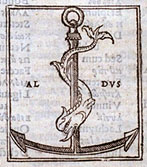 Introduction
Introduction Introduction
IntroductionThe invention of movable type in the mid-fifteenth century and the subsequent development of printing amounted to a vast change in western European thought and habits comparable to that wrought by the information revolution of our own day. Aldus Manutius and his heirs, although not originators of that change, rode the crest of the wave and decisively influenced not only the subsequent course of printing itself, but the general course of ideas in their time. In a very real sense they, along with a few other select printers, determined what the intellectuals of their time would read; thus, their impact on Renaissance thought was extraordinary.
Before he died, Aldus published works in areas as diverse as the interests of his day. From his press came Greek and Latin classical texts, grammars, religious writings, contemporary secular writings, popular works, political and scientific writings, history, and geography. This was the age of discovery, both intellectually and geographically. The West was exploding with the knowledge of new peoples, new lands, new cultures, and new ideas. The Aldine Press stood at the center, recapturing the past and recording the present.
In his nearly twenty years as a printer, Aldus labored tirelessly at the press and left to the world a rich legacy of beautiful books and scholarly texts. These books are still admired for their attractive typography, clean lines, and good design as well as their scholarly contributions. Through his publications, Aldus contributed to the survival of many ancient texts and greatly facilitated the diffusion of the values, enthusiasm, and scholarship of the Italian Renaissance across the rest of Europe. In Aldus was an alliance of printer and scholar, who demonstrated to the printing world that scholarly books could be produced finely as well as profitably; and he convinced the scholarly world of the value of printing.
| Preface | Greek & Latin | Humanist | Rome | Manutii | New World | Checklist |
|---|---|---|---|---|---|---|
 |  |  |  |  |  |  |